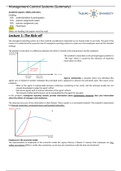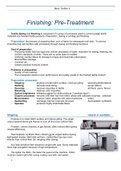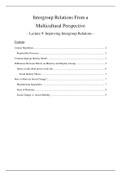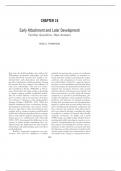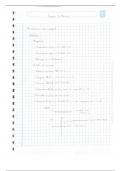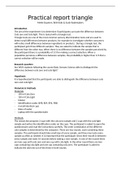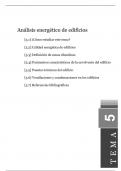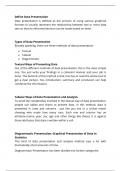MAW-INT: Qualitative Research Methods
Inhoudsopgave
Week 1 – part 1 ................................................................................................................................................ 3
Paradigms .......................................................................................................................................................... 3
Qualitative research ........................................................................................................................................... 5
Week 1 – part 2 ................................................................................................................................................ 5
Quality of research ............................................................................................................................................. 5
Quality and sampling ......................................................................................................................................... 6
Research design & Case studies ......................................................................................................................... 8
Week 2 – part 1 .............................................................................................................................................. 10
Ethics in social science research ....................................................................................................................... 10
Interviews & paradigms ................................................................................................................................... 12
Week 2 – part 2 .............................................................................................................................................. 14
Interview skills .................................................................................................................................................. 15
Semi-structured interviews ............................................................................................................................... 17
Interview techniques – enabling techniques .................................................................................................... 18
Week 3 – part 1 .............................................................................................................................................. 19
Focus Groups .................................................................................................................................................... 19
Participant observation .................................................................................................................................... 22
Week 3 – part 2 .............................................................................................................................................. 25
Ethnography ..................................................................................................................................................... 25
Week 4 ........................................................................................................................................................... 27
Documents lecture............................................................................................................................................ 27
Internet research .............................................................................................................................................. 28
Qualitative data analysis .................................................................................................................................. 30
Coding............................................................................................................................................................... 31
Week 5 – part 1 .............................................................................................................................................. 34
Thematic analysis ............................................................................................................................................. 34
Framework analysis .......................................................................................................................................... 36
Week 5 – part 2 .............................................................................................................................................. 37
Grounded Theory .............................................................................................................................................. 37
Week 6 – part 1 .............................................................................................................................................. 42
Narrative analysis ............................................................................................................................................. 42
, Discourse analysis............................................................................................................................................. 42
(Visual) Semitocis – The study of signs ............................................................................................................. 45
Mixed methods ................................................................................................................................................. 46
Week 6 – part 2 .............................................................................................................................................. 48
Beyond conventional paradigms - Participatory action research ..................................................................... 48
Week 7 ........................................................................................................................................................... 49
Reporting qualitative research ......................................................................................................................... 49
,Week 1 – part 1
Paradigms
Ontology
Assumptions that we have about the nature of reality.
• Whether reality is there
• Are the things that we see real
• How should we define them
Are only the things that we see real? Or are there also things that we can't see real?
The way we define the world around us, influences our belief whether we can study the world and in
what way we can study the world.
Ontological beliefs influence both the kind of topics you want to research and the way you want to
do research.
Ontological beliefs = what we believe the world is like ---> influence epistemological beliefs.
Epistemology = beliefs about how we can acquire knowledge.
Two major positions in social science: objectivism & constructionism (realism & idealism)
Objectivism: this is a pipe. We can all see that it's a pipe, we all recognize it as a pipe.
Constructionism: This is only a pipe because of our cultural frame of reference, because we recognize
it as a pipe.
It is a representation (construction). Does it only exist in our minds? Does it only exist because we
interpreted as it being a pipe.
Everything that we see isn't only just there as an object, it also exists because of our interpretations
and the ideas that we have that are deriving from our own cultural frame of reference --->
Constructionism
These are two different positions that also influences the kind of questions we want to ask about the
world that surrounds us. People as being objects or people as constructs of meaning.
Epistemology
The question how we can know reality.
Objectivism ---> empiricism ---> quantitative research
Empiricism
(Using your senses)
We can use our eyes/ears/nose, to observe the world around us. It is like an object that is detached
from us, and we can look at it or measure it.
Constructionism ---> interpretivism ---> qualitative research
Interpretivism
(Using your imagination / frame of reference to interpret how people construct meaning from their
experiences)
If you look at how we use our senses, we can observe the same objects. But our different views,
result in different interpretations of what we are looking at.
Ontology + Epistemology = Paradigm
, Objectivism
Positivism
Assumes that there is an objective reality that can be studied using the senses.
Post-Positivism
Still assumes an objective reality that can be studied. Also recognizes that we can never fully know
this reality.
Constructionism (The world around us is constructed by ourselves)
Interpretivism
We need to look at what people find important and interpret what they mean and their behaviour,
instead of just measuring it.
Critical realism
Linguistic turn
People didn't only come to adopt the idea that reality is constructed and that people make up
because of their interpretation / cultural frame of reference, reality can have a different meaning for
different people. But also language plays an important role in that particular construction.
Constructionism
Critical theory
Postmodernism
Action research results should result in concrete actions.
Inhoudsopgave
Week 1 – part 1 ................................................................................................................................................ 3
Paradigms .......................................................................................................................................................... 3
Qualitative research ........................................................................................................................................... 5
Week 1 – part 2 ................................................................................................................................................ 5
Quality of research ............................................................................................................................................. 5
Quality and sampling ......................................................................................................................................... 6
Research design & Case studies ......................................................................................................................... 8
Week 2 – part 1 .............................................................................................................................................. 10
Ethics in social science research ....................................................................................................................... 10
Interviews & paradigms ................................................................................................................................... 12
Week 2 – part 2 .............................................................................................................................................. 14
Interview skills .................................................................................................................................................. 15
Semi-structured interviews ............................................................................................................................... 17
Interview techniques – enabling techniques .................................................................................................... 18
Week 3 – part 1 .............................................................................................................................................. 19
Focus Groups .................................................................................................................................................... 19
Participant observation .................................................................................................................................... 22
Week 3 – part 2 .............................................................................................................................................. 25
Ethnography ..................................................................................................................................................... 25
Week 4 ........................................................................................................................................................... 27
Documents lecture............................................................................................................................................ 27
Internet research .............................................................................................................................................. 28
Qualitative data analysis .................................................................................................................................. 30
Coding............................................................................................................................................................... 31
Week 5 – part 1 .............................................................................................................................................. 34
Thematic analysis ............................................................................................................................................. 34
Framework analysis .......................................................................................................................................... 36
Week 5 – part 2 .............................................................................................................................................. 37
Grounded Theory .............................................................................................................................................. 37
Week 6 – part 1 .............................................................................................................................................. 42
Narrative analysis ............................................................................................................................................. 42
, Discourse analysis............................................................................................................................................. 42
(Visual) Semitocis – The study of signs ............................................................................................................. 45
Mixed methods ................................................................................................................................................. 46
Week 6 – part 2 .............................................................................................................................................. 48
Beyond conventional paradigms - Participatory action research ..................................................................... 48
Week 7 ........................................................................................................................................................... 49
Reporting qualitative research ......................................................................................................................... 49
,Week 1 – part 1
Paradigms
Ontology
Assumptions that we have about the nature of reality.
• Whether reality is there
• Are the things that we see real
• How should we define them
Are only the things that we see real? Or are there also things that we can't see real?
The way we define the world around us, influences our belief whether we can study the world and in
what way we can study the world.
Ontological beliefs influence both the kind of topics you want to research and the way you want to
do research.
Ontological beliefs = what we believe the world is like ---> influence epistemological beliefs.
Epistemology = beliefs about how we can acquire knowledge.
Two major positions in social science: objectivism & constructionism (realism & idealism)
Objectivism: this is a pipe. We can all see that it's a pipe, we all recognize it as a pipe.
Constructionism: This is only a pipe because of our cultural frame of reference, because we recognize
it as a pipe.
It is a representation (construction). Does it only exist in our minds? Does it only exist because we
interpreted as it being a pipe.
Everything that we see isn't only just there as an object, it also exists because of our interpretations
and the ideas that we have that are deriving from our own cultural frame of reference --->
Constructionism
These are two different positions that also influences the kind of questions we want to ask about the
world that surrounds us. People as being objects or people as constructs of meaning.
Epistemology
The question how we can know reality.
Objectivism ---> empiricism ---> quantitative research
Empiricism
(Using your senses)
We can use our eyes/ears/nose, to observe the world around us. It is like an object that is detached
from us, and we can look at it or measure it.
Constructionism ---> interpretivism ---> qualitative research
Interpretivism
(Using your imagination / frame of reference to interpret how people construct meaning from their
experiences)
If you look at how we use our senses, we can observe the same objects. But our different views,
result in different interpretations of what we are looking at.
Ontology + Epistemology = Paradigm
, Objectivism
Positivism
Assumes that there is an objective reality that can be studied using the senses.
Post-Positivism
Still assumes an objective reality that can be studied. Also recognizes that we can never fully know
this reality.
Constructionism (The world around us is constructed by ourselves)
Interpretivism
We need to look at what people find important and interpret what they mean and their behaviour,
instead of just measuring it.
Critical realism
Linguistic turn
People didn't only come to adopt the idea that reality is constructed and that people make up
because of their interpretation / cultural frame of reference, reality can have a different meaning for
different people. But also language plays an important role in that particular construction.
Constructionism
Critical theory
Postmodernism
Action research results should result in concrete actions.

